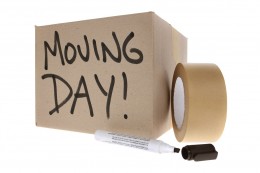
Moving is stressful, but many people are unaware just how stressful until they actually relocate.
Assuming that you’ve got a mortgage in the first place (this guide from Money Advice Service will help you establish if that’s realistic) a move can cost on average about £5,000 more than anticipated, a source of pain in itself for 40% of those people surveyed. Factor in other causes for concern such as packing up belongings (71% of people found this stressful), finding the right location (57%) and dealing with agents (56%) and one can see the possibility of problems.
Planning ahead won’t alleviate all of the problems of moving home, but it can eliminate many of them. Here are a few pointers:
- Contact removal firms and get some prices. Removal firms typically charge £3-600 although this is affected by a number of factors.
- Start packing up at least two weeks before the move. Objects such as books, ornaments, paintings, picture frames, and other non-essentials can be stored early. If storage is needed, at least temporarily, then do your research and plan exactly how you will get heavy objects to the facility.
- The garden objects can be largely cleared away in plenty of time, loading tools and into a box. Potted plants will need to be moved closer to the day.
- Buy a multi compartment tool box, label each compartment, and start deconstructing beds, wardrobes and anything else that needs taking to pieces. Place the nuts, bolts, screws and other pieces in the different compartments, labelling each one.
- Similarly, a large box marked ‘electrical items’, with each plug, controller and piece labelled, is a good idea.
- Plan the day in your mind; from dropping the children off at school or with relatives early, to the jobs that need to be completed in each room, to the route you will take to your new home in a heavily-laden car.
- Don’t leave anything outside overnight on the last night, even in the summer. Insects, bugs, cats and even people may take an unwelcome interest in the items, and we all know of the fickle nature of English weather.
- If necessary book a kennel or cattery for your animal, and drop them off in the morning.
- Compile a list of telephone numbers or email addresses that are important, and contact them to change over or cancel everything necessary when you know of the moving date. This should include the local authority, utility providers, magazine subscription services, and others.
- Read the meters before you leave, taking a photograph of them on your phone camera if necessary.
- Prepare a box and label it very clearly ‘things we will need from day one’. These items might include tea, coffee, the kettle and two cups; toilet paper and cleaning materials; a radio/CD player; reading materials; four way plug sockets; takeaway menus for the first night; toiletries and medication; and anything else that is definitely required for the inaugural night.
- It’s also worth preparing a secondary box or bag, with bed linen, curtains and towels, and perhaps the clothes for day two – which is also likely to be frenetic.
- The toughest part of the day – say goodbye to your house. Take a quick look around, making sure the windows are closed and no electrical sockets are on. Close the door, and simultaneously close a chapter of your life at the same time.




 POSTED BY
POSTED BY 

